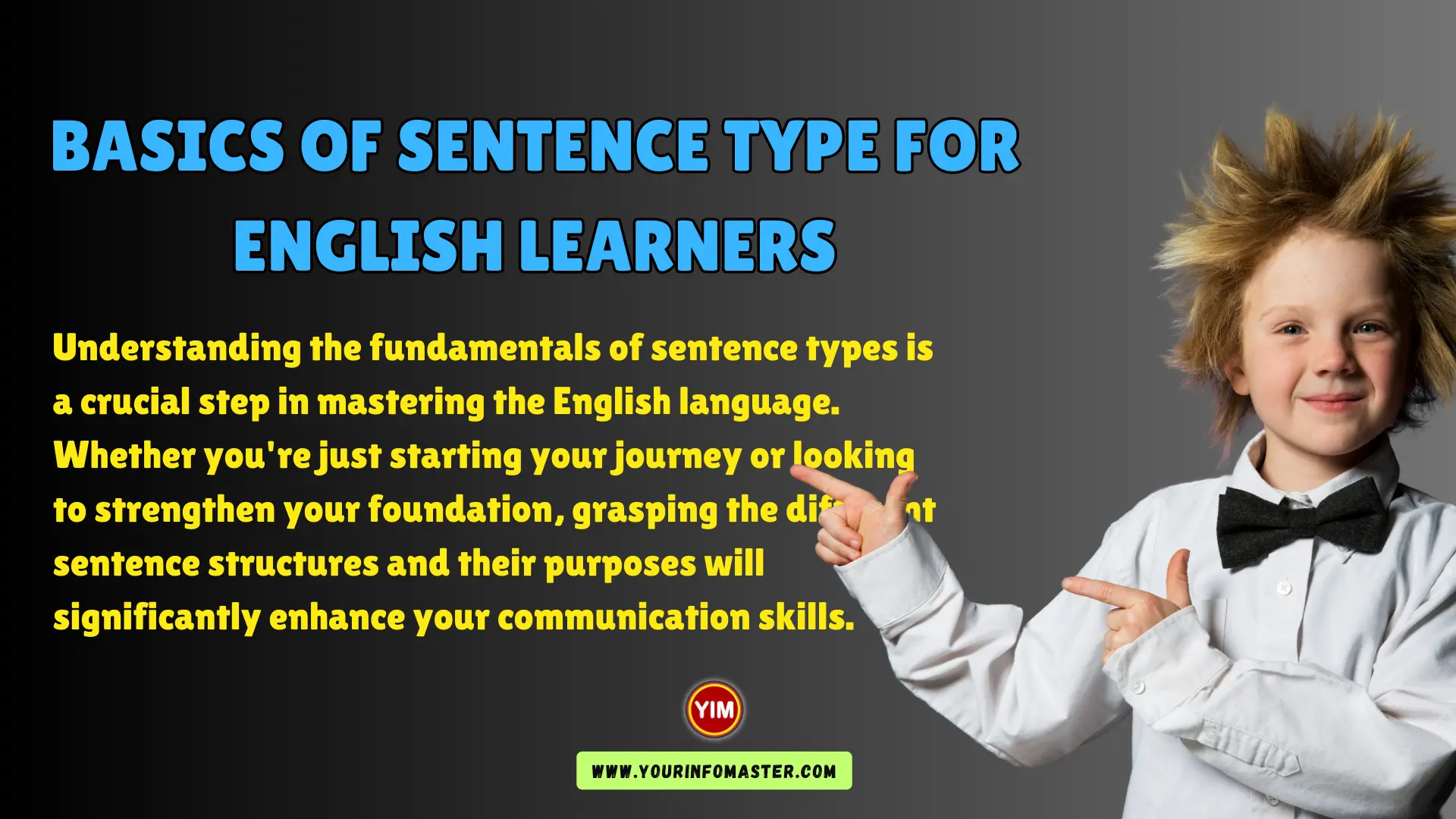In this article I will teach you about Basics of Sentence Type for English Learners.
Understanding the fundamentals of sentence types is a crucial step in mastering the English language. Whether you’re just starting your journey or looking to strengthen your foundation, grasping the different sentence structures and their purposes will significantly enhance your communication skills.
In this blog post, we will delve into the basics of sentence types, shedding light on their classifications and providing examples that will guide you towards becoming a more confident and effective English communicator.
Also read: What are the Animals Names in Spanish?
Four Sentence Types in English
These sentence structures play a vital role in conveying different intentions and emotions in your communication. Let’s explore each type further and understand how they shape the way we express ourselves.
1. Declarative Sentences
Declarative sentences make statements or convey information. They provide facts, opinions, or descriptions.
Examples:
- The sun rises in the east.
- She loves to read books.
- The car is parked in the garage.
- Elephants are the largest land animals.
- I enjoy listening to classical music.
- The Earth orbits around the sun.
- Paris is known as the City of Love.
- The movie was both thrilling and suspenseful.
- The moonlight shimmered on the calm ocean.
- The painting on the wall depicts a serene landscape.
2. Imperative Sentences
Imperative sentences give commands, make requests, or provide directions. They express a sense of urgency or instruction.
Examples:
- Please pass the salt.
- Close the window, it’s chilly outside.
- Study for your exam this weekend.
- Bake the cake at 350°F for 30 minutes.
- Don’t forget to water the plants daily.
- Wait for me at the bus stop.
- Take a left turn at the next intersection.
- Read the first chapter before the class.
- Clean your room before your friends arrive.
- Send me the report by tomorrow morning.
3. Interrogative Sentences
Interrogative sentences are used to ask questions. They seek information, clarification, or opinions.
Examples:
- Are you coming to the party tonight?
- What time does the concert start?
- How do you make this delicious pasta?
- Where is the nearest post office?
- Did you enjoy the movie last night?
- Why did you choose that book to read?
- Which color do you prefer, blue or green?
- Have you ever visited New York City?
- Who won the championship last year?
- Are you feeling better now?
4. Exclamatory Sentences
Exclamatory sentences express strong emotions, excitement, or surprise. They often end with an exclamation mark.
Examples:
- What a stunning sunset!
- I can’t believe we won the game!
- How beautiful the fireworks are!
- Wow, that’s an impressive painting!
- It’s so hot outside today!
- What a fantastic performance!
- Congratulations on your new job!
- I’m thrilled to see you again!
- What a delicious meal this is!
- How amazing this adventure has been!
Mastering these four sentence types is essential for effective communication in English. They allow you to convey different meanings, intentions, and emotions, enabling you to express yourself accurately and vividly.
Also read: What are the Names of Birds in Spanish?
Conclusion
Understanding the four fundamental sentence types – declarative, imperative, interrogative, and exclamatory – is crucial for achieving clarity and diversity in communication. Each type serves a unique purpose, enabling language learners to convey information, give commands, ask questions, and express emotions effectively in English.
If you really enjoyed the article “Basics of Sentence Type for English Learners,” then I would be very grateful if you’d help it spread by emailing it to your friends or sharing it on Twitter, Instagram, or Facebook. Thank you!
Have you read “Basics of Sentence Type for English Learners?“ Which of these blogs are you reading, and how is it similar to one of them?
Read More
- How Do You Writing Descriptive Paragraphs?
- 5 Tips to Improve Writing in English
- 10 Common Sentence Mistakes in English
- Common Spelling Problems in English
- Showing Addition in Written English
- Synonyms for Words that start with E
- Synonyms for Words that start with D
- Synonyms for Words that start with C
- Synonyms for Words that start with B
- 30 Spanish Sayings With English Translations
- 50 Quotes on Love in Spanish that will Melt Your Heart
- 50 Most Famous Spanish Quotes
- 20 Most Famous Spanish Proverbs
- 10 Facts About the Spanish Language
- Synonyms for Words that start with A
- What are the Names of Clothing in Spanish?
- What are Pets in Spanish?







